Wednesday October-15 2025 13:45:32
Stainless steel soil sieve is a basic tool used to classify and separate soil and similar granular materials. Stainless steel soil sieves are generally categorized into coarse, medium, and fine sieves based on the sieve's aperture size and mesh size. Coarse sieves typically have apertures larger than 2 mm and are used to separate gravel and larger debris, corresponding to lower mesh sizes, such as 10 mesh. Medium sieves have apertures between 0.1 and 2 mm and are commonly used for sand analysis, with a medium mesh size range, such as 60 mesh. Fine sieves have apertures smaller than 0.1 mm and are primarily used to separate silt and clay, with higher mesh sizes, such as 200 mesh.
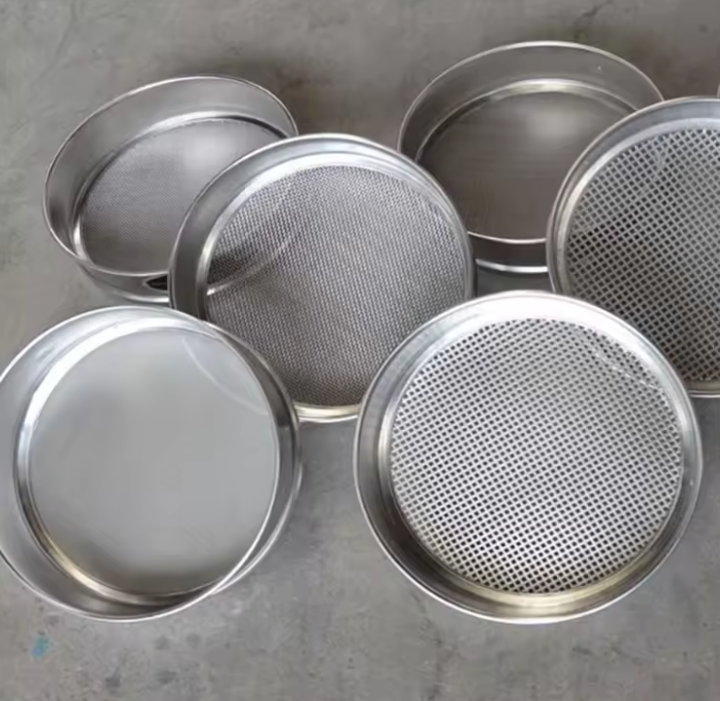
Stainless steel soil sieves are widely used in soil analysis and screening due to their significant advantages. These advantages include excellent durability, high precision, and easy cleaning, making them ideal tools for soil analysis and particle classification.
Corrosion Resistance and Durability: Stainless steel offers excellent corrosion resistance. Soil often contains moisture, acidic and alkaline substances, and various chemical components. Ordinary metal sieves are susceptible to rust or corrosion in such environments, affecting their service life and screening accuracy. Stainless steel sieves effectively resist these corrosion conditions, ensuring long-term stable performance. Furthermore, stainless steel's high strength and wear resistance allow it to withstand the impact and wear of daily use without deformation or breakage.
High Screening Precision: The sophisticated manufacturing process for stainless steel wire allows for precise control of wire thickness and weave density, ensuring highly uniform sieve mesh size. This is crucial for laboratories requiring precise particle size analysis. This uniform pore size ensures accurate and reproducible screening results, meeting the requirements of various international standards.
Easy Cleaning and Maintenance: The smooth surface of stainless steel resists the adhesion of soil particles and debris. After use, it can be easily cleaned with water or a specialized detergent and dries quickly. This not only facilitates routine maintenance but also prevents cross-contamination between samples, ensuring pure and reliable experimental results.
Hygienic and Safe: Stainless steel is a non-toxic and harmless material that releases no harmful substances into soil samples, making it ideal for use in fields such as agriculture and environmental science, where sample purity is paramount.
Wide Applications: Stainless steel soil sieves are suitable not only for soil but also for screening sand, gravel, powders, and granular materials. Their excellent performance makes them a popular screening tool in a variety of industries, including the chemical, construction, and food industries.
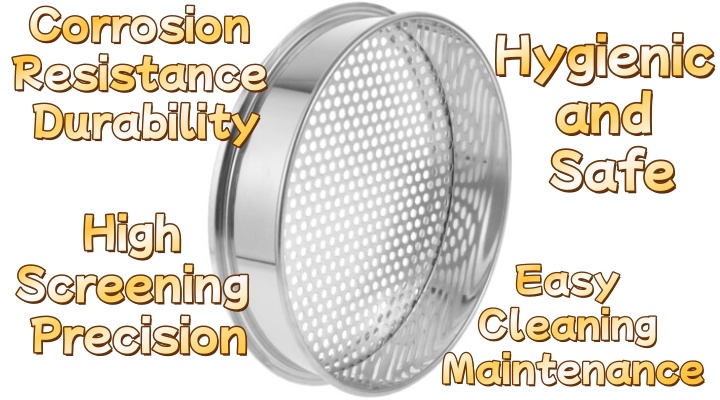
|
Net |
Aperture (mm) |
Net |
Aperture (mm) |
Net |
Aperture (mm) |
|
2 mesh |
12.5 |
45 mesh |
0.4 |
220 mesh |
0.065 |
|
3 Mesh |
8 |
50mesh |
0.355 |
240mesh |
0.063 |
|
4 mesh |
6 |
55 mesh |
0.315 |
250 mesh |
0.061 |
|
5 mesh |
6 |
60 mesh |
0.28 |
280 mesh |
0.055 |
|
6 mesh |
4 |
65 mesh |
0.25 |
300 mesh |
0.050 |
|
8 mesh |
3 |
70 mesh |
0.224 |
320 mesh |
0.045 |
|
10 mesh |
2 |
75 mesh |
0.2 |
325 mesh |
0.043 |
|
12 mesh |
1.6 |
80 mesh |
0.18 |
340 mesh |
0.041 |
|
14 mesh |
1.43 |
90 mesh |
0.16 |
360 Head |
0.040 |
|
16 mesh |
1.25 |
100 mesh |
0.154 |
400 mesh |
0.0385 |
|
18 mesh |
1 |
110 mesh |
0.15 |
500 mesh |
0.0308 |
|
20 mesh |
0.9 |
120 mesh |
0.125 |
600 mesh |
0.026 |
|
24 mesh |
0.8 |
130 mesh |
0.112 |
800 mesh |
0.022 |
|
26 mesh |
0.71 |
140 mesh |
0.105 |
900 mesh |
0.020 |
|
28 mesh |
0.68 |
150 mesh |
0.100 |
10 00 mesh |
0.015 |
|
30 mesh |
0.6 |
160 mesh |
0.096 |
1800 mesh |
0.010 |
|
32 mesh |
0.58 |
180 mesh |
0.09 |
2000 mesh |
0.008 |
|
35 mesh |
0.50 |
190 mesh |
0.08 |
2300 mesh |
0.005 |
|
40 mesh |
0.45 |
200 mesh |
0.074 |
2800 mesh |
0.003 |
There are many different types of stainless steel soil sieves, but they are generally classified by the size of the sieve, specifically the mesh size and aperture size. Based on this criterion, soil sieves can be broadly divided into three categories: coarse, medium, and fine, each playing a different role at various stages of soil analysis.
Coarse Sieve (Large Aperture, Low Mesh)
Size Range: Typically has a pore size of 2 mm or larger and a low mesh size (e.g., 10 mesh, 20 mesh).
Purpose: Primarily used for preliminary screening to separate gravel, rocks, plant roots, and large debris from soil. This type of sieve is very common in field work and sample pretreatment, quickly removing large particles to prepare for subsequent detailed analysis.
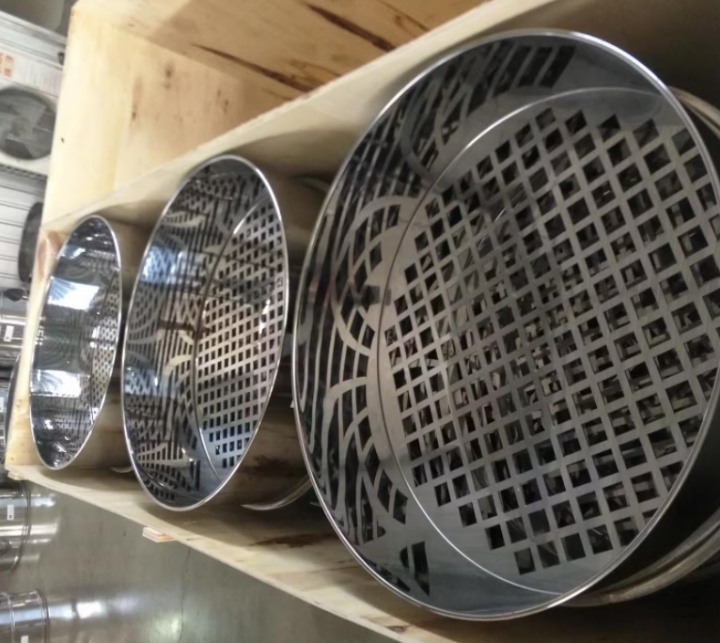
Medium Sieve (Medium Aperture, Medium Mesh)
Size Range: Typically has a pore size between 0.1 mm and 2 mm and a medium mesh size (e.g., 60 mesh, 100 mesh).
Purpose: Primarily used for analyzing sand in soil. For soil texture classification, sand particles are typically defined within this size range. This type of sieve is a common tool in soil physics laboratories.
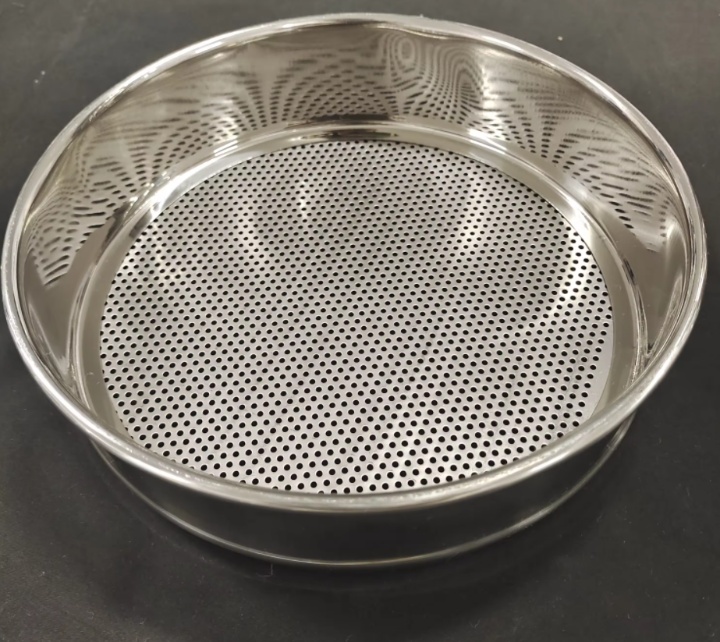
Fine Sieve (Small Aperture, High Mesh)
Size Range: Typically has a pore size less than 0.1 mm (100 microns) and a high mesh size (e.g., 200 mesh, 270 mesh). Applications: Used to analyze silt (silt) and clay particles in soil. These particles are extremely small and require high-precision sieves to separate. Fine sieves are essential for soil particle size distribution analysis (particle size analysis).
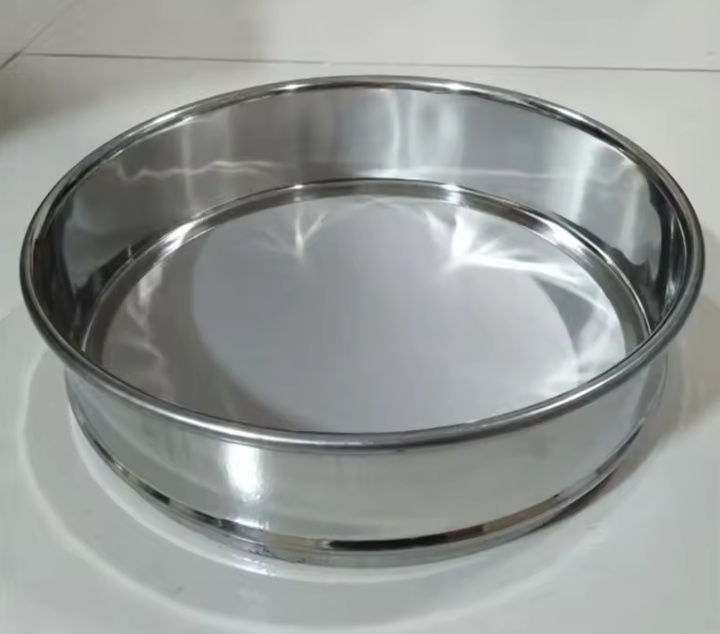
Stainless Steel Soil Sieve offers different solutions for horticultural and laboratory use. For horticultural use, lightweight plastic or stainless steel models are available. Commonly available stainless steel soil sieve sets are available in 8-inch, 10-inch, or 12-inch diameters to remove rocks and impurities for finer soil. For laboratory sieving, the stainless steel soil sieve set, made of durable 304 stainless steel, offers greater precision and corrosion resistance. The mesh size is adjustable or interchangeable, typically ranging from 0.5 mm to 10 mm (approximately 8 to 35 meshes), meeting the requirements for screening sand, gravel, and stone.
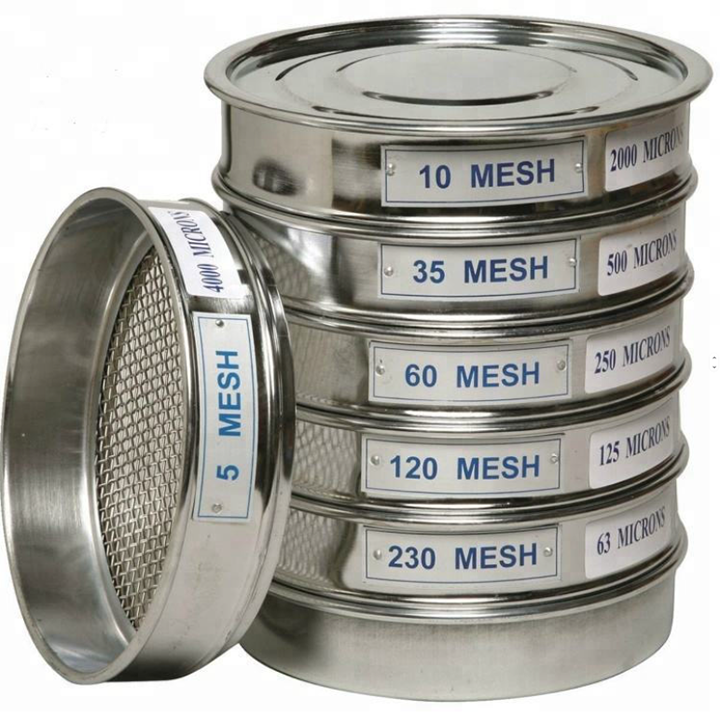
As a manufacturer of stainless steel soil sieves, we not only produce stainless steel models but also offer soil sieve sets, perfect for gardening, sand screening, and screening mixed particles. We can customize sieves with frame diameters of 10cm, 20cm, 30cm, and 40cm, and mesh sizes of 0.075mm, 0.1mm, 0.25mm, 0.5mm, 1mm, 5mm, 20mm, and 60mm. We also offer pre-screening trials with your material.
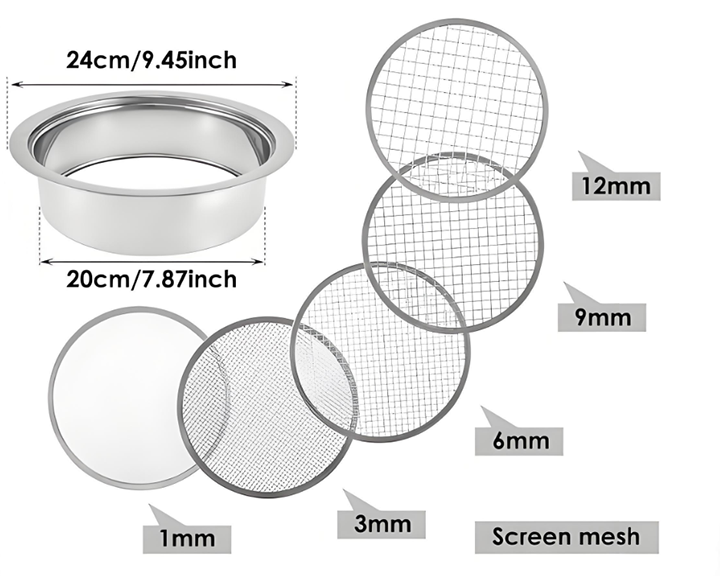
Stainless steel soil sieves have a wide range of applications, primarily based on their core function: precisely grading particulate matter and removing impurities. Their applications extend beyond soil itself; as a fundamental tool, they play a critical role in a wide range of fields.
Scientific Research and Laboratory Analysis: Stainless steel soil sieves are indispensable in scientific research. Researchers use them to analyze particle size on a variety of samples, for example, determining the particle size distribution of a substance, which is fundamental to many studies in materials science, geology, and environmental science. They also separate and purify samples, isolating particles of varying sizes from a mixture for more in-depth chemical or physical analysis. Sample pretreatment involves sieving to remove large particles or debris, ensuring sample homogeneity and purity before conducting precise experiments.
Agricultural Production and Quality Control: In agriculture, stainless steel soil sieves are primarily used to assess soil physical properties. Sieving soil texture can be used to guide agricultural production decisions, such as irrigation, fertilization, and cropping practices. Seed and fertilizer grading ensures uniform seed size and improves sowing efficiency; or fertilizer granules are graded to ensure even distribution and effective absorption.
Engineering Construction and Materials Processing: Stainless steel soil sieves are used in engineering to ensure material performance and quality. For example, in building material grading, sand, gravel, aggregate, and other construction materials are screened for particle size to meet specific engineering standards and ensure the strength and stability of mixtures such as concrete and asphalt. In powder and granular processing, in industries such as chemical and metallurgy, various powders and granular products are graded to meet production process or product quality requirements.
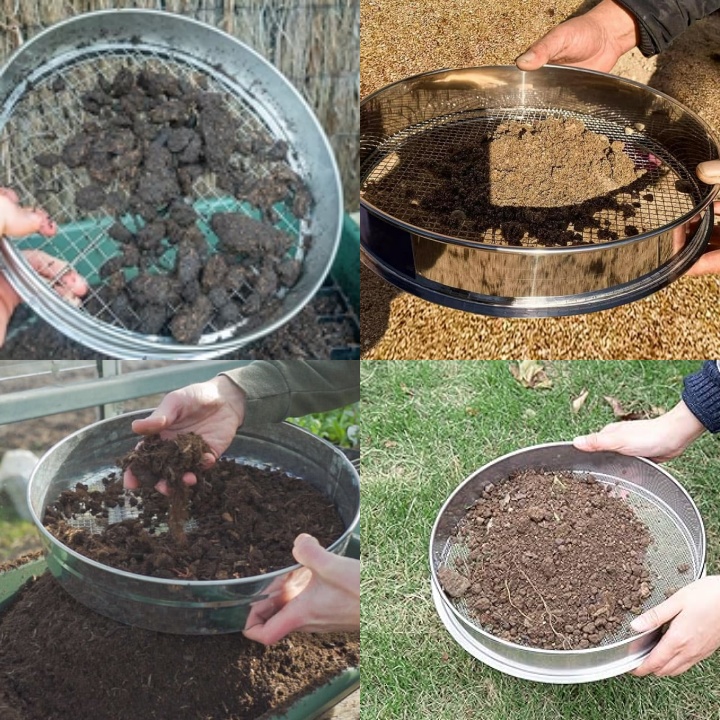
As a physical sorting device, the stainless steel soil sieve has demonstrated its stability and reliability in practical applications. The optimal method for soil screening is using wire mesh, which is resistant to common corrosion and abrasion, ensuring consistent performance over time. Furthermore, the smooth surface of stainless steel makes it easy to clean, effectively preventing cross-contamination between samples and ensuring high-purity results every time. Stainless steel soil sieves provide essential support for a variety of operations requiring material classification and are an indispensable component in many experimental and production processes.
0.5mm stainless steel soil sieve for lab testing
0.5mm stainless steel soil sieve for lab testing refers to a stainless steel soil sieve with a sieve hole size of 0.5 mm. This sieve is often used to separate soil particles of diff...
Dahan Machinery provides soil sieves of various specifications and models to meet the screening needs of different particle sizes and...
Laboratory Sieve Shaker Machine Price
Laboratory sieve shaker machine is a device used for laboratory sieving and particle analysis...
Soil sieve price vary widely, ranging from $3 to $500. Small, handheld garden sieves are generally cheaper due to...
Oct 15, 2025
Stainless steel soil sieve is called soil sieving instrument or soil analysis sieve, and the mesh siz...
Oct 14, 2025
Standard Test Sieve is a commonly used particle analysis tool in laboratories and industrial sites. I...
Oct 10, 2025
material test sieve with sample
Material test sieve with sample By testing samples such as quartz, fertilizers, seeds, etc., the part...
Sep 20, 2025
Standard Test Method for Particle-Size Analysis of Soils
Standard Test Method for Particle-Size Analysis of Soils is used to determine the weight proportions ...
![]()
Then we look forward to hearing from you
Contact Us
Industrials
Yanjin county forest park gate to the west 1000 meters north road sitemap
